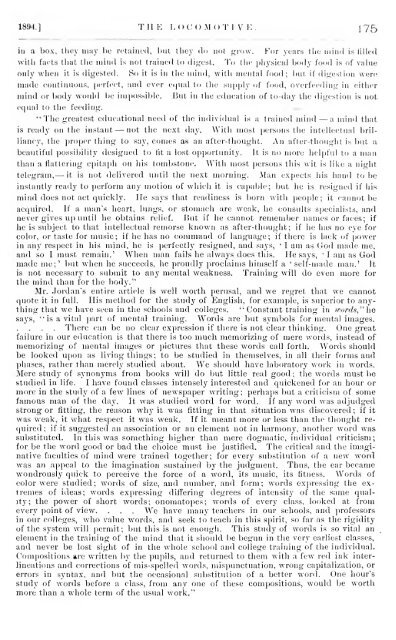The Locomotive - Lighthouse Survival Blog
The Locomotive - Lighthouse Survival Blog
The Locomotive - Lighthouse Survival Blog
You also want an ePaper? Increase the reach of your titles
YUMPU automatically turns print PDFs into web optimized ePapers that Google loves.
1894.] 'I'll E L('() .M OT I V E 175<br />
iii a lx>\. thi'v may be retained, bu1 they do nol grow. For years the miad is filled<br />
with tacts thai the mind is ool trained to digest. To the physical body loud is of value<br />
ouly when it is digested. So it is in the mind, with mental food; but if digestion were<br />
made continuous, perfect, and ever equal to tin; supply of food, overfeeding in either<br />
mind or body would be impossible. But in the education of to-day the digestion is not<br />
equal to the feeding.<br />
"<strong>The</strong> greatest educational need of the individual is a trained mind-— a mind that<br />
is ready on the instant — not the next day. With most persons the intellectual bril-<br />
liancy, the proper thing to say, comes as an after-thought. An after-thought is but a<br />
beautiful possibility designed to fit a lost opportunity. It is no more helpful to a man<br />
than a Mattering epitaph on his tombstone. With most persons this wit is like a night<br />
telegram,— it is not delivered until the next morning. Man expects his hand to be<br />
instantly ready to perform any motion of which it is capable; but he is resigned if his<br />
mind does not act quickly. He says that readiness is born with people; it cannot be<br />
acquired. If a man's heart, lungs, or stomach are weak, he consults specialists, ami<br />
never gives up until he obtains relief. But if he cannot remember names or faces; if<br />
he is subject to that intellectual remorse known as after-thought; if he has no eye for<br />
color, or taste for music; if he has no command of language; if there is lack of power<br />
in any respect in his mind, lie is perfectly resigned, and says, ' I am as God made me,<br />
ami so I must remain.' When man fails he always does this. He says, ' I am as God<br />
made me; 1<br />
but when he succeeds, he proudly proclaims himself a ' self-made man.' It<br />
is not necessary to submit to any mental weakness. Training will do even more for<br />
the mind than for the body."<br />
Mr. Jordan's entire article is well worth perusal, and we regret that we cannot<br />
quote it in full. His method for the study of English, for example, is superior to anything<br />
that we have seen in the schools and colleges. "Constant training in wards," he<br />
says, " is a vital part of mental training. Words are but symbols for mental images.<br />
. <strong>The</strong>re can be no clear expression if there is not clear thinking. One great<br />
failure in our education is that there is too much memorizing of mere words, instead of<br />
memorizing of mental images or pictures that these words call forth. Words should<br />
be looked upon as living things;<br />
phases, rather than merely studied<br />
to be studied in themselves, in all their forms and<br />
about. We should have laboratory work in words.<br />
Mere study of synonyms from books will do but little real good; the words must be<br />
studied in life. I have found classes intensely interested and quickened for an hour or<br />
more in the stud} 7 of a few lines of newspaper writing; perhaps but a criticism of some<br />
famous man of the day. It was studied word for word. If any word was adjudged<br />
strong or fitting, the reason why it was fitting in that situation was discovered; if it<br />
was weak, it what respect it was weak. If it meant more or less than the thought required<br />
; if it suggested an association or an element not in harmony, another word was<br />
substituted. In this was something higher than mere dogmatic, individual criticism;<br />
for be the word good or bad the choice must be justified. <strong>The</strong> critical and the imaginative<br />
faculties of mind were trained together; for every substitution of a new word<br />
was an appeal to the imagination sustained by the judgment.<br />
wondrously quick to perceive the force of a word, its music,<br />
Thus, the ear became<br />
its fitness. Words of<br />
color were studied; words of size, and number, and form; words expressing the extremes<br />
of ideas; words expressing differing degrees of intensity of the same quality;<br />
the power of short words; onomatopes;<br />
We<br />
words of every class, looked at from<br />
every point of view. . . .<br />
have many teachers in our schools, and professors<br />
in our colleges, who value words, and seek to teach in this spirit, so far as the rigidity<br />
of the system will permit; but this is not enough. This study of words is so vital an<br />
element in the training of the mind that it should be begun in the very earliest classes,<br />
and never be lost sight of in the whole school and college training of the individual.<br />
Compositions are written by the pupils, and returned to them with a few red ink interlineations<br />
and corrections of mis-spelled words, mispunctuation, wrong capitalization, or<br />
errors in syntax, and but the occasional substitution of a better word. One hour's<br />
study of words before a class, from any one of these compositions, would be worth<br />
more than a whole term of the usual work."
















